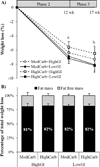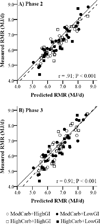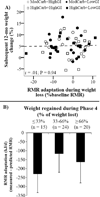Effects of carbohydrate quantity and glycemic index on resting metabolic rate and body composition during weight loss
- PMID: 26530933
- PMCID: PMC4634125
- DOI: 10.1002/oby.21268
Effects of carbohydrate quantity and glycemic index on resting metabolic rate and body composition during weight loss
Abstract
Objective: To examine the effects of diets varying in carbohydrate and glycemic index (GI) on changes in body composition, resting metabolic rate (RMR), and metabolic adaptation during and after weight loss.
Methods: Adults with obesity (n = 91) were randomized to one of four provided-food diets for 17 weeks. Diets differed in percentage energy from carbohydrate (55% or 70%) and GI (low or high) but were matched for protein, fiber, and energy. Body weight, body composition, RMR, and metabolic adaptation (measured RMR-predicted RMR) were measured during weight loss and subsequent weight stability.
Results: No effect of dietary carbohydrate content or GI on body weight loss or percentage of weight lost as fat mass (FM) was observed. Measured RMR was significantly lower (-226 kJ/day [95% CI: -314 to -138 kJ/day], P < 0.001) than predicted RMR following weight loss, but this difference was attenuated after 5 weeks of weight stability. Metabolic adaptation did not differ by dietary carbohydrate content or GI and was not associated with weight regain 12 months later.
Conclusions: Moderate-carbohydrate and low-GI diets did not preferentially reduce FM, preserve lean mass, or attenuate metabolic adaptation during weight loss compared to high-carbohydrate and high-GI diets.
© 2015 The Obesity Society.
Conflict of interest statement
Figures




References
-
- Anderson JW, Konz EC, Frederich RC, Wood CL. Long-term weight-loss maintenance: A meta-analysis of US studies. Am J Clin Nutr. 2001;74:579–584. - PubMed
-
- Major GC, Doucet E, Trayhurn P, Astrup A, Tremblay A. Clinical significance of adaptive thermogenesis. Int J Obes (Lond) 2007;31:204–212. - PubMed
-
- Muller MJ, Bosy-Westphal A. Adaptive thermogenesis with weight loss in humans. Obesity. 2013;21:218–228. - PubMed
-
- Bosy-Westphal A, Kossel E, Goele K, Later W, Hitze B, Settler U, et al. Contribution of individual organ mass loss to weight loss-associated decline in resting energy expenditure. Am J Clin Nutr. 2009;90:993–1001. - PubMed
Publication types
MeSH terms
Substances
Grants and funding
LinkOut - more resources
Full Text Sources
Other Literature Sources
Medical

